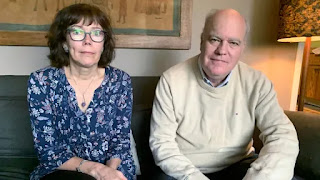Executive Director, Euthanasia Prevention Coalition
CBC radio program - White Coat, Black Art featured a story of a family who learned of the euthanasia death of a family member, after she died. They never had a chance to say goodbye.
Dr Brian Goldman, the host of the CBC radio program reports:
Cynthia's voice wavered as she recalled how she found out about Cheryl's (Cheryl was Cynthia's sister) death.Canada's euthanasia (MAiD) law does not require a person to inform family members of their plan to be killed. Goldman reports:
"I was teaching piano on Zoom and the phone rang," she said.
"My husband took the phone, talked to my dad and came into the room and said, 'You have to mute.' And so I muted, and he told me that Cheryl had died, which at that moment, and really even now, just seemed unfathomable."
Victor, Cynthia and her brother, Philip Hiebert, say they wish the rules around medical assistance in dying gave more consideration to family members who wish to say goodbye. But as both Ontario's chief coroner and a lawyer who specializes in legal issues pertaining to health care explain, the updates to Canada's Criminal Code that allow for eligible Canadians to pursue MAID stipulate that the patient's right to privacy comes first.
Dr. Dirk Huyer, the chief coroner of Ontario, could not speak to the specifics of Cheryl Hiebert's case. But he said it's not the first time that a family has been left out of a person's decision to have MAID.The article explains that Cheryl had early onset Alzheimer's but her memory and capacity remained very good. The family didn't realize that the changes in Canada's euthanasia law made Cheryl, who was not terminally ill, qualify for MAiD.
Nobody would tell them how she died.
The story explains that nobody was willing to tell them how she died. They demanded an autopsy, they asked the funeral director and they contacted the Coroner's office. The Coroner conducted an investigation and determined that the MAiD laws had been properly followed.
Cynthia has concerns about MAiD (euthanasia) based on her sister's death. Goldman reports:
Cynthia says she was an advocate for MAID before losing her sister this way, and had written letters for the registered charity Dying with Dignity in the past.The sad reality is that Canadians have the right to privacy. The family has suffered in the death of Cheryl and they lost more then the opportunity to say goodbye.
Legalized medical killing changes everything. There is no chance to care for someone, to ensure that they are properly cared for and kept comfortable, to show love and support, to hold their hand as they die naturally or to say goodbye.


No comments:
Post a Comment